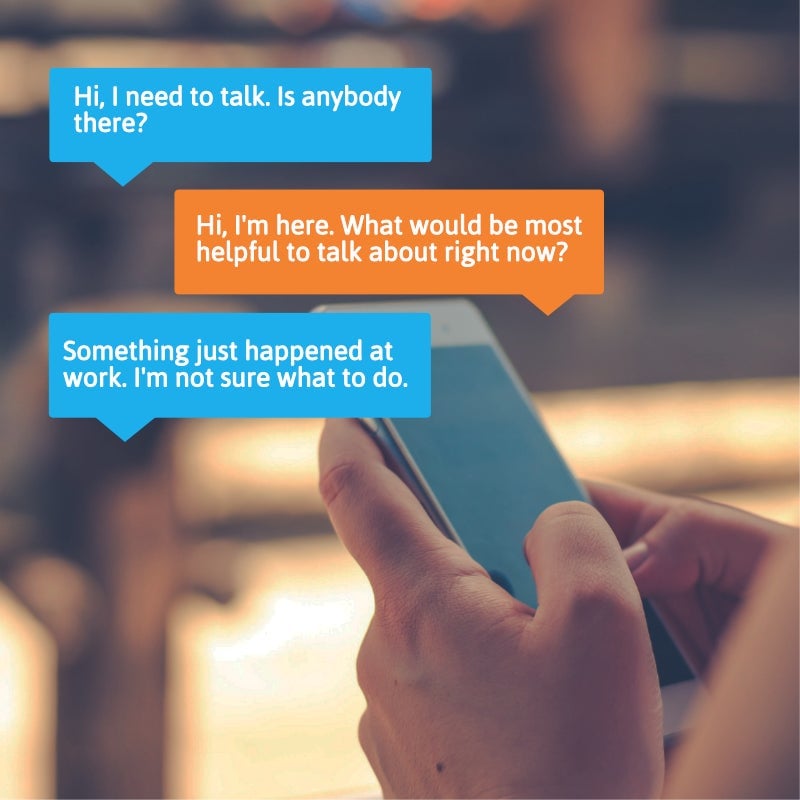A new crisis hotline lets you text a counselor when you’re anxious at work
If there’s one problem with the mental health services available through your company, it’s that they’re available through your company.


If there’s one problem with the mental health services available through your company, it’s that they’re available through your company.
Sure, the professionals who answer hotlines are required to keep your identity confidential, but just the connection between the firm that pays you and the one that asks you to crack open and share your deep fears and insecurities can leave a person uneasy.
Last year, Jaime-Alexis Fowler, a former public relations and media executive in San Francisco, considered this dilemma after a conversation with a stressed-out mentee who had waited too long before getting in touch. There ought to be a service for people caught in the throes of a work-related crisis, she thought, one without any ties back to the employer, but that’s still free. “Executive coaching is priced out of reach for most Americans,” she tells Quartz at Work.
Seeing an opening, Fowler launched a nonprofit called Empower Work, a hotline that connects people with trained volunteer counselors via text, the method of communication Fowler said was overwhelming preferred by her pilot group. (The text number is 510-674-1414.) She assumes they chose to text, instead of call, because that way they could have a totally private conversation on a personal device. There’s no risk of being overheard, which is no small thing now that so many offices are big open spaces.
Therapy bots are increasingly popular for the same reason, but Fowler has found that what draws people to Empower Work is the opportunity to engage with a living, breathing person, one who understands workplace experiences, like bullying, unbearable bosses, or the fear of failing.
Having launched in early 2018, Empower Work’s counselors and anonymous texters have already shared 20,000 messages in about 400 conversations, she says, and the nonprofit has attracted clients in most US states. The average exchange lasts about 90 minutes, says Fowler, in which time the counselor and texter might share 200 messages.
Most of the reasons people reach out fall into one of two categories: either they’re experiencing an intense emotion—“I’m just feeling overwhelmed” or “I’m feeling incredibly anxious,” they might begin—or they want to talk through a particular issue. “It might be ‘I just got this meeting on my calendar and I’m afraid I’m going to get fired,’” Fowler says, “or, ‘A bunch of male colleagues said inappropriate things to me and I reported it and now I’m worried about the consequences.’”

When someone texts, a response can be expected within about 10 minutes.
The counselors do not give advice, but instead listen, discuss options, and help the person devise a plan. Texters remains anonymous and, for ethical reasons, are asked not to identify their employers or any individuals by name. Someone who is experiencing an intense mental health issue or is in need legal help will be connected to an appropriate resource.
In her pre-launch research, Fowler found that 95% of Americans she had surveyed had lived through a workplace issue that affected their emotional wellbeing. About half of that group left their job a result. Sometimes that’s positive, she says. “But for people with less social capital, including women or people of color, the outcomes were much worse,” she says. They may be more likely to quit without having another position lined up and it may take longer to recover financially and emotionally.
Since launching, Empower Work has found that among the people who have texted them, 80% identify as women or gender fluid, 72% identify as a person of color, and 15% identify as LGBTQ.
Fowler notes that in the US, for better or worse, work and what you produce or gain from it is a huge part of a person’s identity. Her goal isn’t to push for any particular policy change, but to create more supportive workplaces. She also plans to share Empower Work’s analytics data next year, to allow others to track and share data on workplace issues in real time.
Editor’s note: An earlier version of this story included an incorrect figure for the percentage of clients who are LGBTQ.